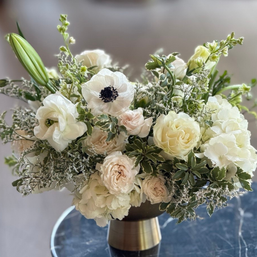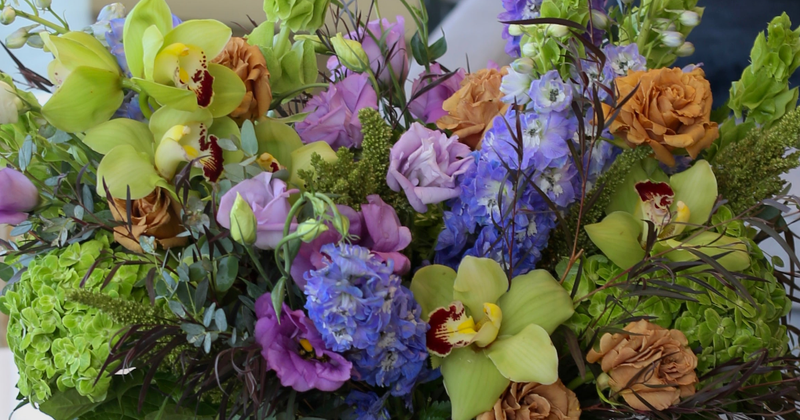INTRODUCTION
In California, anyone can call themselves a florist. No certification, no exam, no license — just open a shop and start arranging.
At Pink Clover, we believe this needs to change. Flowers are more than décor. They touch emotions, mark life’s milestones, and enter hospitals, schools, and funeral homes. With such influence comes responsibility — and responsibility deserves regulation.
That’s why we’re advocating for a state-recognized florist license — a step toward professionalism, public trust, and the future of the floral industry.
WHY FLORIST LICENSING MATTERS
1. Protecting Consumers
Without licensing, anyone can open a “floral business,” even without understanding flower safety, handling standards, or ethical sourcing. A license would ensure every florist meets minimum knowledge and hygiene standards, preventing cases of spoiled flowers, poor storage, and customer deception.
Licensing would create accountability, giving customers confidence that their florist is trained, qualified, and responsible.
2. Elevating the Profession
Floristry is often undervalued — seen as a hobby, not a profession. A license changes that. It defines floristry as a skilled trade requiring education, creativity, and technical expertise.
Just as hairstylists, electricians, and estheticians must earn licenses, florists should too. Licensing recognizes florists as professionals, not just service providers.
3. Ensuring Safe Work Environments
Florists work with wires, blades, sprays, dyes, and chemicals daily. Without proper training, injuries and allergic reactions are common. A standardized license would include safety training, waste handling, and environmental care, creating safer workplaces and eco-friendly practices.
4. Preventing Exploitation and Unregulated Labor
Licensing would protect workers — especially those in large floral operations — from underpaid or unsafe conditions. When every florist must register and pass minimum compliance requirements, it becomes harder for unethical businesses to exploit untrained labor.
5. Encouraging Education and Growth
A license wouldn’t block entry into the industry — it would guide it.
By requiring basic training and continuing education, California could nurture a new generation of florists who understand design, sustainability, and mental health benefits of flowers. It would also open doors for schools, colleges, and non-profits to offer recognized floral education programs — creating jobs and opportunities.
HOW A FLORIST LICENSE COULD WORK
We propose creating a California Florist License Program (CFLP) under the Department of Consumer Affairs — the same agency that regulates professions like cosmetology, real estate, and contracting.
The goal is simple: protect consumers, strengthen the industry, and give florists the professional recognition they deserve.
1. Education Requirement
All applicants would complete 40–80 hours of training through state-approved programs or floral schools.
The curriculum could cover:
-
Principles of floral design and color theory
-
Safe flower and plant handling (including allergy-safe and non-toxic materials)
-
Sustainable sourcing and environmental care
-
Workplace safety, sanitation, and waste management
-
Customer service and ethical business practices
Training would ensure that even new florists entering the field understand both artistry and responsibility — not just arrangement techniques but also how to operate safely and legally.
2. Practical Exam
Applicants would be required to complete a hands-on design test.
This would evaluate:
-
Design composition and balance
-
Proper use of mechanics and materials
-
Flower care, conditioning, and hydration methods
-
Professional finishing and presentation
Practical exams could be offered at licensed floral schools or regional test centers, ensuring fair accessibility throughout California.
3. Written Exam
A short written component would test foundational knowledge such as:
-
Flower and plant identification
-
Proper storage and transportation standards
-
Basic safety and first aid in the workplace
-
Ethics, environmental responsibility, and customer rights
This ensures every licensed florist demonstrates both technical and theoretical understanding.
4. License Renewal & Continuing Education
Licenses would require renewal every three years, similar to cosmetology and design professions.
Renewal could include:
-
A few hours of continued education on new techniques, sustainability practices, or safety updates
-
Proof of ongoing work experience or community participation (e.g., floral therapy programs, workshops, or mentorship)
This encourages florists to stay current, continuously learning and improving as design trends and materials evolve.
5. Fair & Accessible Fee Structure
Licensing should never create barriers for small businesses or independent designers.
Proposed structure:
-
Initial Application Fee: Around $100–$150
-
Education Program Cost: Market-based, with options for grants or financial aid for low-income applicants
-
Renewal Fee: Every three years at a reduced rate
All funds would go toward maintaining fair oversight, inspections, and industry development — not bureaucracy or profit.
6. Oversight and Public Registry
The state would maintain an online verification system where customers can search for licensed florists.
This transparency helps:
-
Customers confirm legitimacy before booking large events
-
Florists showcase verified credentials
-
Regulators prevent unethical or unsafe operations
7. Pathways for Existing Florists
Working florists with proven experience would not be penalized. They could apply for a “Provisional License”, valid for one year, allowing time to complete training or exams.
This transitional system supports current professionals while raising overall standards without disruption.
8. Collaboration with Educational Partners
The CFLP could partner with community colleges, floral schools, and nonprofits to offer official courses — expanding career opportunities and accessibility.
It would also allow organizations like the Pink Clover Foundation to contribute by developing programs that merge design education with therapeutic and community value.
BENEFITS FOR CLIENTS AND COMMUNITIES
Licensing isn’t just about regulation — it’s about building a stronger, safer, and more trusted floral industry that benefits everyone. When florists are trained, accountable, and recognized by the state, both clients and communities experience long-term positive change.
Better Quality & Longevity
A licensed florist must meet consistent handling and care standards, which means flowers stay fresh longer and look better. Proper hydration, temperature control, and chemical-free conditioning not only enhance the appearance of arrangements but also reduce waste from premature spoilage. This improves both customer satisfaction and environmental sustainability.
Higher Trust and Transparency
Customers deserve confidence when they choose a florist — especially for emotional occasions like weddings, memorials, or hospital deliveries. Licensing introduces a public registry, allowing anyone to verify a florist’s credentials online.
That transparency builds trust and eliminates unreliable operators who damage the industry’s reputation. Knowing your florist is trained and licensed ensures professionalism, ethical business practices, and clear pricing standards.
Cleaner, Safer Practices
Licensing would require education in safe chemical use, waste disposal, and sustainability. Many florists currently lack proper training in handling dyes, floral foam, or cleaning products that can harm both workers and the environment. A licensing framework could:
-
Promote biodegradable materials
-
Minimize pesticide misuse
-
Encourage proper waste separation and recycling
The result is a greener floral industry that supports California’s environmental goals while creating safer workplaces for employees.
Community Confidence
Schools, hospitals, hotels, and event venues could rely on licensed florists for safe and reliable service. This would reduce the risk of allergic reactions from inappropriate plant use and ensure flowers used in public spaces meet safety and hygiene standards.
Community events, city contracts, and educational programs could all prioritize licensed professionals — bringing consistent quality to public projects.
Economic Benefits
The economic ripple effects of licensing would be significant.
-
Job Creation: Training programs, state exams, and continuing education would create new roles for instructors, evaluators, and administrators.
-
Higher Wages: Licensed professionals can justify fair pay, aligning floristry with other skilled trades.
-
Business Growth: Verified professionals would attract larger contracts, wedding planners, and corporate clients who prefer working with recognized experts.
-
Consumer Protection: Reducing fraud and poor-quality work prevents economic loss for customers who currently risk spending thousands on unqualified providers.
-
Tax Revenue & Industry Stability: Licensing helps formalize small businesses, leading to better compliance and stronger contribution to California’s economy.
In short, licensing is an investment in the entire floral ecosystem — improving livelihoods, protecting customers, and creating a more sustainable market.
When florists are trained, fairly compensated, and held to clear standards, everyone wins — from clients and workers to local communities and the state itself.
PINK CLOVER’S MISSION
At Pink Clover we’ve always believed in education, innovation, and responsibility. Through our Floral Therapy for Kids initiative, we’ve seen firsthand how floristry affects emotions and learning.
Now, we want to take that same care to the entire industry — by advocating for a California florist license law that supports fair wages, safe workplaces, and creative excellence.
We’re starting conversations with industry peers, schools, and policymakers to push this movement forward. The goal isn’t control — it’s respect. Respect for the art, for the clients, and for the professionals who dedicate their lives to flowers.
HOW YOU CAN SUPPORT THE MOVEMENT
Change in any industry begins with awareness — and the floral industry is no exception. For California florists to gain the professional respect and protection they deserve, we need a unified voice. Your participation — no matter how small — makes a real difference.
1. Share and Start the Conversation
Spread this article across your professional circles. Share it on Instagram, Facebook, LinkedIn, and local community forums.
Tag local florists, wedding planners, event coordinators, and small business groups. The more voices we gather, the faster this conversation reaches policymakers.
-
Tag and engage with @aifd_official (American Institute of Floral Designers), @societyoffloraldesigners, and @slowflowerssociety — organizations that support floral education and ethics.
-
Mention @calbusinessnetwork and @cagov in posts to draw the attention of the California Department of Consumer Affairs and state legislators who could help draft the licensing framework.
2. Join Discussions and Advocacy Groups
We’re building a coalition of florists, educators, and event professionals who believe in stronger standards.
We’ll soon host roundtable sessions and webinars where florists can share experiences, suggest licensing models, and collaborate on building the proposal.
3. Partner with Educational Institutions
If you’re part of a community college, floral design school, or vocational training center, consider becoming an educational partner. Programs like Floral Design Institute, Los Angeles Trade–Technical College, and California State Florists’ Association (CSFA) could help shape the curriculum and provide accessible pathways for new florists.
Educational institutions interested in supporting the initiative can contact foundation@pinkcloverla.com for collaboration opportunities.
4. Support Floral Education and the Pink Clover Foundation
Our non-profit, the Pink Clover Foundation, already runs Floral Therapy for Kids — a program that introduces creativity and emotional healing through flowers.
By donating or volunteering, you help us expand our impact and lay the groundwork for statewide floral education programs that could become part of the licensing curriculum.
5. Engage with Local Media and Industry Platforms
If you write, blog, or work with media — help us share this story.
We’re reaching out to:
-
California Chamber of Commerce
-
Los Angeles Times Small Business section
-
Green Matters, Floral Review Magazine, and Event Pros LA
-
Sustainable Floristry Network and Slow Flowers Journal
These outlets and communities can amplify the conversation around fair standards, sustainability, and workforce safety. If you’re part of any of these networks, let’s connect.
6. Stay Involved and Follow Our Progress
Follow @pinkclover_flowers on Instagram for campaign updates, event invitations, and behind-the-scenes work from our team.
We’ll also share upcoming petitions, open letters, and public comment opportunities once the proposal moves toward formal review.
FAQ
Q: Would licensing make it harder for new florists to start?
A: No. The goal is to create affordable, accessible education — not to block entry. Licensing ensures fair competition and equal opportunity for trained professionals.
Q: Are other states doing this?
A: Louisiana remains the only U.S. state with mandatory florist licensing. California could lead the next wave — setting a modern, fair, and inclusive model focused on education, not restriction.
Q: How would this affect flower shops already operating?
A: Existing florists could be “grandfathered in” with a grace period to complete the license process or demonstrate equivalent experience.
Q: Would customers notice a difference?
A: Absolutely. Licensed florists would offer better flower quality, safer handling, transparent pricing, and a higher level of professionalism — building stronger customer trust.
CONCLUSION
It’s time to give California florists the same respect as other licensed professions. A florist license is not a barrier — it’s a bridge to a better industry.
Pink Clover stands ready to lead this change — for our team, our clients, and every floral artist who believes flowers deserve professionalism and purpose.
🌿 Join the movement. Support the idea of a California Florist License. Let’s grow something lasting.










